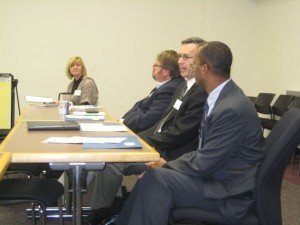My last post about community planning, completed a sequence about the representation function of my three function model and so it is time to move onto the second:
- Representation (link to first of three)
- Planning
- Delivery
The last post about Community Planning emphasised why it is important not to confuse your local plan with the plan agreed with your partners.
When you meet with partners from the local authority, police, NHS, local schools, local businesses and so on, they will each have their own plans. Their plans are worth no more than your local plan, although they might have spent more money on it and so may like to think theirs is more important.
So your role is negotiation, aiming for agreement to as much of your plan as possible. Remember you won’t get all of it or even necessarily the parts you would most like. Perhaps the people of Maltby would have prioritised a by-pass over everything else. They were never going to get a by-pass but other chapters in their plan were very successful.
So, you need to think about how you can increase your plan’s credibility. First, consider your methods. How did you write the plan? How many people did you involve in the planning? I estimate the Maltby plan included material from over 400 people. The plan itself included by-lines from people who didn’t necessarily agree with the main argument. An uneven plan can be more credible because it shows the plan is not the product of one small group of people.
Think about how you’re going to present your local plan. Negotiations may involve several meetings with partners. Who will take part and how will you support them?
Some groups send different people to each meeting. This may show wide support for the plan but it sacrifices continuity. Consider a small group that meets between the meetings with partners to debrief the last meeting and prepare for the next. You can then send one or two members of the group to each meeting. Thus you preserve continuity whilst demonstrating wider support.
I would normally send at least two people to meetings with partners. More than two might be difficult to accommodate. With two people present, one can be the main representative and the other take notes and make suggestions from a less pressured perspective. They can rotate these two roles.
Such arrangements, so long as they are not too complex, can appear impressive. A consistent line represented over several meetings by a small group may appear more credible than the same line represented by one spokesperson.
Remember you won’t have a lot of money or assets compared with other partners so you need to show you are an organised and disciplined group.
Pay attention to the plans of your other partners; get hold of copies and read them. In your planning group, divide their proposals into four groups. Proposals that
- support what is in your local plan.
- address issues not covered in your local plan.
- could be tweaked to line them up with your plan (or where your plan could be tweaked to line up with their proposals).
- you cannot agree to.
Work out what you want to support, what you think could be changed and what you oppose. Some things you may oppose but be willing to trade for other parts of your plan.
Keep your powder dry! Don’t go in and simply state what you support or don’t support. You may be able to gain support for your priorities from partners who appreciate your support for theirs. You’re likely to lose some arguments and so plan ahead!
And finally, don’t sacrifice your integrity, be consistent and don’t walk out if you can possibly avoid it.
These negotiations can be fraught with difficulty. I’d love to hear your stories about how they’ve worked out, positive or disastrous!
